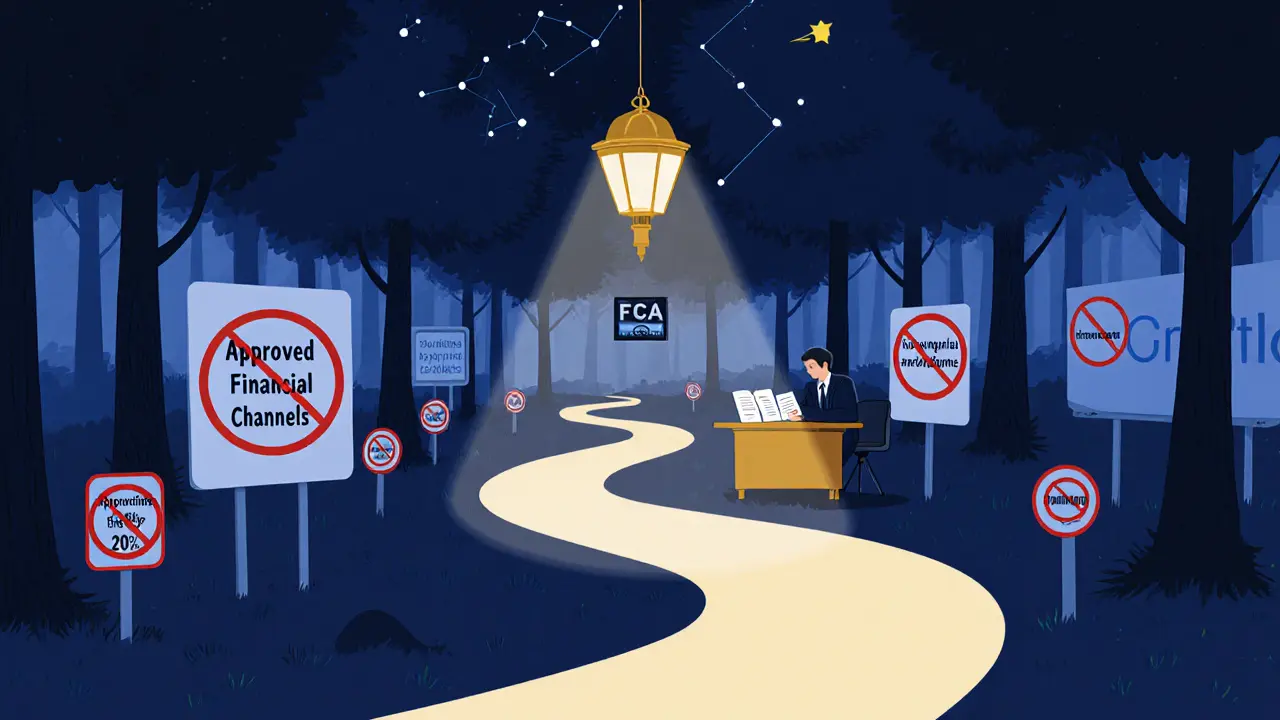
UK Crypto Compliance Cost Estimator
Calculate Your Compliance Costs
Estimate the costs for your crypto business to comply with the UK's new FCA advertising regulations.
Since October 8, 2023, advertising crypto in the UK has changed forever. If you’re a firm trying to reach UK consumers-or a regular person wondering why you’re seeing fewer crypto ads on TV-you need to know what’s really going on. The Financial Conduct Authority (FCA) didn’t just tweak the rules. It rewrote them. And the impact is felt everywhere: from social media banners to late-night radio spots.
What Exactly Did the FCA Ban?
The FCA didn’t ban crypto ads outright. But it made them almost impossible to run for most companies. Under the Financial Services and Markets Act 2000 (Financial Promotion) (Amendment Order) 2023, any promotion of fungible or transferable cryptoassets-like Bitcoin, Ethereum, or even fan tokens-now counts as a financial promotion. That means it’s treated the same way as promoting stocks, bonds, or derivatives. Before this, many crypto firms could run ads with flashy claims like “Earn 15% daily!” or “Get rich quick with crypto.” Now, those ads are illegal. The FCA requires every single ad to include a personalized risk warning that’s at least 20% of the screen or print space. It can’t be buried in tiny text. It must be clear, simple, and tailored to the person seeing it. No more generic disclaimers like “Crypto is volatile.”The 24-Hour Cooling-Off Rule
Here’s where it gets even stricter. If you click on a crypto ad, sign up, or even start filling out a form, the firm can’t let you invest right away. There’s a mandatory 24-hour cooling-off period. You have to wait a full day before you can transfer money or confirm a trade. This isn’t a suggestion. It’s a legal requirement. Why? Because the FCA found that most retail investors who lost money in crypto did so on impulse. They saw an ad, got FOMO, and clicked. The cooling-off rule forces a pause. It’s designed to stop people from acting emotionally. Firms now need tech systems that lock transactions for 24 hours after initial contact. Many small platforms couldn’t build this fast enough-and walked away from the UK market.Who Can Even See These Ads?
On October 3, 2024, the Broadcast Committee of Advertising Practice (BCAP) added another layer. Rule 14.5.5 bans crypto ads from appearing on mainstream TV, radio, billboards, or general websites. That means no more crypto ads during the Premier League, on YouTube before a music video, or on Facebook feeds. The only places crypto ads are allowed are on specialized financial channels-like Bloomberg TV, Financial Times digital platforms, or investor-focused podcasts. But even then, the audience must be pre-vetted. The firm must prove you’ve passed their appropriateness test. That means showing you have experience trading leveraged products, understand market volatility, and know how crypto works. It’s not enough to say you’re “interested.” You have to prove you’re qualified.
What Firms Must Do to Stay Legal
If you’re a crypto firm operating in the UK, you now need:- A system that generates personalized risk warnings based on each user’s profile
- A 24-hour transaction lock after any initial interaction
- A client categorization process that separates retail investors from professionals
- Appropriateness assessments for every single potential investor
- Records of every ad, every warning, and every customer interaction kept for at least five years
What Happens If You Break the Rules?
The FCA doesn’t warn twice. If you run a non-compliant ad, you could face fines up to 10% of your annual turnover. That’s not a slap on the wrist. For a small exchange, that could mean millions. The FCA has already issued multiple enforcement notices. Some firms have been forced to stop all UK marketing while they fix their systems. Even worse, your compliance with these rules now affects your ability to get full FCA authorization. The FCA’s May 2025 Discussion Paper (DP25/1) made it clear: if you can’t follow the advertising rules now, you won’t get licensed to operate in the future. This isn’t just about ads-it’s about whether your company survives in the UK.
What About Crypto ETNs?
There’s one exception. Exchange Traded Notes (ETNs) that track crypto prices are now allowed for retail investors-but only if they’re traded on FCA-approved UK exchanges like the London Stock Exchange. These ETNs aren’t direct crypto ownership. They’re financial instruments, and they come with their own set of rules. Firms promoting them still need risk warnings and appropriateness checks. But at least they’re not banned from mainstream channels entirely. Still, even these aren’t protected by the Financial Services Compensation Scheme (FSCS). If the issuer goes bust, you lose everything. The FCA is very clear: crypto investments are high-risk. No safety net exists.How Does the UK Compare to Other Countries?
The UK’s approach is one of the strictest in the world. The EU’s MiCA framework, which took effect in June 2024, allows broader advertising as long as disclaimers are included. Switzerland has almost no restrictions. Singapore permits ads with simple risk warnings. The UK chose a different path. Instead of trying to make crypto look safe, they made it hard to advertise. The goal isn’t to stop crypto. It’s to stop people from being misled. The FCA’s message is simple: if you don’t understand the risks, you shouldn’t be seeing the ads.What’s Next?
The FCA isn’t done. Their May 2025 Discussion Paper outlines a full regulatory framework for crypto trading platforms, lending, staking, and DeFi. They’re still gathering feedback until June 13, 2025. But one thing is clear: the UK is building a system where crypto can exist-but only if it plays by strict, consumer-first rules. Firms that adapt will survive. Those that try to cut corners won’t. And for everyday investors? The ads might be gone, but the protection is real. You won’t see another “Get Rich with Solana!” billboard. But you also won’t lose your life savings to a misleading tweet.Can I still see crypto ads in the UK?
Yes-but only in very limited places. Crypto ads are banned from mainstream TV, radio, social media feeds, billboards, and general websites. You might still see them on financial news channels like Bloomberg, or on investor-focused websites and podcasts, but only if you’ve already passed a pre-vetting process proving you understand the risks.
Why did the FCA ban crypto ads on TV and radio?
Because the FCA found that most retail investors who lost money in crypto did so after seeing flashy, misleading ads. TV and radio reach millions of people who aren’t experienced investors. The FCA decided it was too risky to let unregulated, emotionally manipulative ads target the general public. The ban protects people who don’t have the knowledge to evaluate crypto’s extreme volatility.
What happens if a crypto company ignores these rules?
They face serious penalties. The FCA can fine firms up to 10% of their annual turnover. They can also force them to stop all UK marketing, block their website from UK users, or deny them full regulatory authorization. Several firms have already been forced to exit the UK market after failing compliance checks.
Do these rules apply to NFTs and DeFi projects?
Not yet. The current rules only cover fungible and transferable cryptoassets like Bitcoin and Ethereum. NFTs and most DeFi protocols aren’t included in the financial promotion regime-for now. But the FCA’s May 2025 Discussion Paper signals that they’re planning to expand regulation to cover DeFi and staking in the near future.
Can I still invest in crypto in the UK?
Yes, absolutely. The rules don’t ban crypto investment-they just make it harder for firms to push it onto people who don’t understand it. You can still buy Bitcoin or Ethereum through FCA-registered platforms. But you’ll need to go through identity checks, risk assessments, and a 24-hour waiting period before your first trade. The goal is to make sure you’re not investing blindly.
Are crypto ETNs safer than direct crypto?
They’re more regulated, but not safer. Crypto ETNs are traded on approved UK exchanges and come with better disclosures. But they’re still high-risk. They’re not backed by physical assets, and if the issuer fails, you lose everything. The FCA doesn’t protect them with the Financial Services Compensation Scheme (FSCS), so there’s no safety net.
How long do firms have to keep records of their crypto ads?
Firms must keep records of every financial promotion-including ads, emails, landing pages, and customer interactions-for at least five years. This includes screenshots, timestamps, and proof that risk warnings were shown and understood. The FCA audits these records during compliance checks.
Why are some crypto firms leaving the UK?
Because the cost of compliance is too high. Building personalized risk systems, verifying investor profiles, and maintaining five-year records requires expensive tech and legal teams. Many small exchanges can’t afford it. As of March 2024, only 15 out of 60 firms that applied for temporary FCA registration got full approval. For others, leaving the UK market was the only option.
17 Comments
Write a comment
More Articles

RadioShack DeFi and Moonriver Crypto Exchange: What’s Real and What’s Not
There is no RadioShack crypto exchange on Moonriver. This review clarifies the confusion between the nonexistent RadioShack DeFi and the struggling FreeRiver DEX on Moonriver, revealing why neither is worth using in 2025.


Kaitlyn Boone
November 22, 2025 AT 17:43i swear every crypto ad i saw last year was like a infomercial for a miracle cure. now its just... quiet. kinda nice actually.